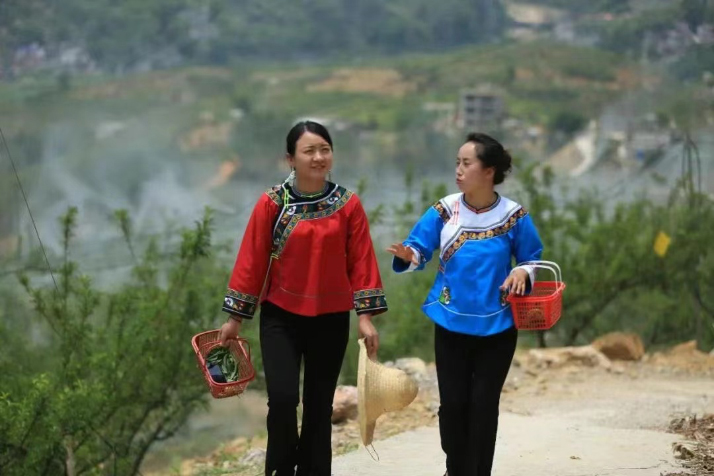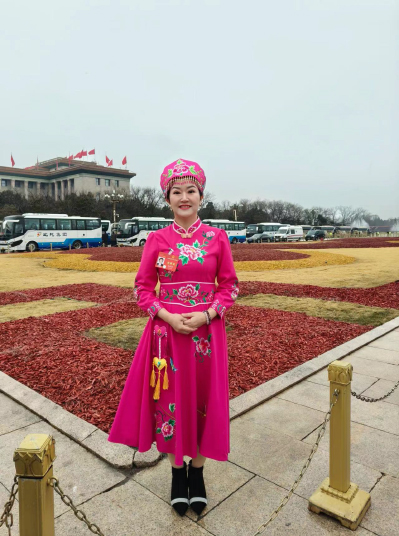| China |
| Female NPC deputies from ethnic minority groups stand out | |
|
|
|
China's most significant annual political event, known as the Two Sessions, commenced in Beijing on March 4, bringing together thousands of deputies to the 14th National People's Congress (NPC), the country's top legislature, and members of the 14th Chinese People's Political Consultative Conference (CPPCC) National Committee, the top political advisory body, from all corners of the country.
The NPC is elected for a term of five years and convenes once a year, usually in March, in Beijing. NPC deputies hold part-time positions and many are ordinary citizens representing diverse professions and regions. During the NPC session, deputies engage in reviewing numerous reports, including the government work report. On March 5, a group of female representatives of China's diverse ethnic minorities, standing outside the Great Hall of the People where the NPC deputies assemble, particularly caught the eye of the media. With China being home to 56 ethnic groups, these deputies come from across the country, and include those serving in the expansive territories of northwest China's Xinjiang Uygur Autonomous Region and others dedicated to the mountainous and riverine landscapes of the southwestern province of Guizhou. As NPC deputies, they bring genuine perspectives and convey the needs of local people, offering their insights and endeavors in advancing national development, promoting ethnic unity and fostering social progress.  Yang Enlan
Yang Enlan (Miao ethnic group) Born in the 1990s, Yang Enlan holds the position of chief of the Plant Protection Station of the Agriculture and Rural Bureau in Liupanshui, Guizhou, where villagers affectionately refer to her as the "guardian of farmland." She stood out among the group of NPC deputies due to her striking attire, which was adorned with the colorful embroidery for which the Miao are renowned. After completing her master's degree in plant protection at South China Agricultural University, Yang decided to forgo the allure of urban life and instead returned to her hometown of Liupanshui. Recognizing that the robust growth of crops forms the bedrock of rural revitalization, she dedicates herself to the prevention and management of pests, diseases and rodents, employing her professional expertise and technological know-how to safeguard crops and ensure food security for the local community. China's rural revitalization is a comprehensive strategy aimed at improving the economic prosperity, living standards and overall development of rural areas. It is an extension of the country's poverty alleviation campaign, which had eradicated absolute poverty nationwide by late 2020. This initiative involves efforts to modernize agricultural practices, enhance infrastructure, promote rural industries, improve living conditions and narrow the urban-rural divide. "I hope to bring the voices of my hometown to the NPC and contribute to agricultural development and rural revitalization," Yang told Beijing Review. Currently, her focus is on addressing rodent monitoring challenges in rural regions. Recognizing the substantial damage these pests inflict on crops, she advocates the reinforcement of rodent monitoring stations in rural areas. "Our aim is to establish a more comprehensive network for rodent monitoring, enabling timely detection and control of infestations to safeguard the hard-earned harvests of villagers," she emphasized. "As a plant protection professional, it is my commitment to shield the village's crops and stored grain from harm." Looking to the future, Yang is highly optimistic. She expressed a hope increased attention and support would be given to agricultural endeavors, emphasizing the importance of collective efforts in advancing the prosperity and resilience of rural communities.  Lu Dan
Lu Dan (Bouyei ethnic group) Dressed in traditional Bouyei clothes, Lu Dan is the villagers' committee chief of Zhifu Village in Anshun, Guizhou. Lu aspires for more people to savor the fruits of her village's labor, and specifically the specialty fruit of her hometown: the honey sugar plum. Zhifu, a longstanding settlement of the Bouyei ethnic group, has steadily paved the way to a better life by tapping into the most prevalent characteristics of its local heritage. The honey sugar plum, a cherished local specialty, has been dubbed the "Hermès among plums" by Chinese netizens, owing to its exceptional quality and economic significance. In recent years, the village has developed an industry around the fruit. Through the continuous improvement of growing techniques, the yield of the plums has increased year by year, with quality, and in turn sales, also continuing to improve. In 2023, Zhifu established the Prosperity Through Plums brand, dedicated to local plum sugar products. This initiative involves fortifying both online and offline sales channels, resulting in substantial operational profits that not only improve the livelihoods of fruit farmers but also significantly bolster the village's collective economy. Lu, in her capacity as an NPC deputy, focuses on the development of rural industries. "I have brought with me suggestions on the industry's most urgent needs in terms of infrastructure, hoping to attract more attention to the industrial development of my hometown and get more people to understand and care about the overall situation of rural industrial development," she told Beijing Review. Lu's wish is that through joint efforts, this "sweet business" can continue to develop.  Kong Feifei
Kong Feifei (Xibe ethnic group) "You are welcome to visit Qapqal Town!" Kong Feifei, deputy mayor of Qapqal Town in Qapqal Xibe Autonomous County, Xinjiang, said, warmly extending an invitation to the media outside the Great Hall of the People on March 5. Kong has been deeply involved in the county's community work since graduating from university in 2008. Last year, she was elected as a deputy to the NPC. "Only by reaching out to communities both physically and mentally can one truly understand the needs of the public," Kong told Beijing Review. Years of experience have given her a deeper understanding of the expectations related to rural revitalization, enabling her to serve and advocate for the public in a more practical manner. During last year's Two Sessions, Kong advocated for natural gas heating in rural areas during the winter and put forth related suggestions. She expressed her gratitude for the policy support received from the central and regional governments, highlighting the launch of a natural gas pipeline project by the local government for the benefit of the people. Presently, the pipeline has been extended to the doorsteps of villagers. Kong expressed optimism, saying, "We expect to achieve full gasification by October. At that point, people will only need to turn a valve to enjoy the convenience of heating and bathing, truly experiencing the beautiful life brought by clean(er) energy." Given natural gas is a cleaner-burning fuel than other traditional sources of heating such as coal or wood, the use of natural gas can contribute to reducing air pollution and improving air quality in rural communities. This year, Kong tabled five proposals, including one to support the development of the Qapqal Newspaper, a county-level Xibe-language newspaper. Additionally, she proposed the establishment of a Qapqal Xibe Autonomous County Embroidery Industrial Park. "Xibe embroidery is one of the treasures of our diverse ethnic cultures and was even included in the third batch of national intangible cultural heritage lists in 2011," she said. Kong hopes to integrate existing resources to create a cultural exchange and research and development center for embroidery that combines the efforts of enterprises, universities and research institutions. "This will not only allow more people to appreciate the unique charm of Xibe embroidery craftsmanship, but will also attract more people to participate in the inheritance and protection of traditional ethnic handicrafts," she concluded. (Print Edition Title: Empowering Voices) Copyedited by Elsbeth van Paridon Comments to taozihui@cicgamericas.com |
|
||||||||||||||||||||||||||||||
|